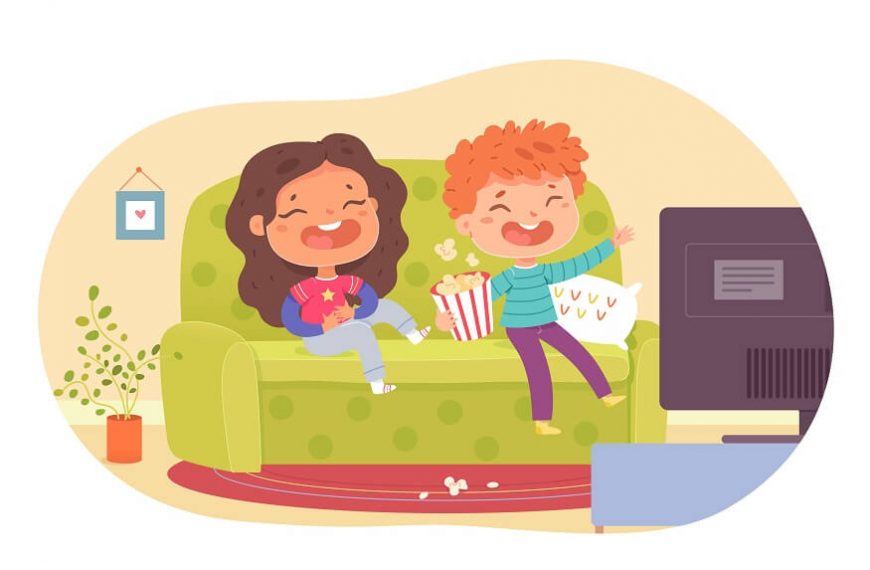In a world where digital screens have become ubiquitous, the once innocent joy of children spending a Saturday morning watching cartoons has escalated into a concerning trend. No longer are children just enjoying an episode or two of their favourite show; they are increasingly spending hours on end in front of the TV, becoming victims of TV addiction. Consider Meera, a 9-year-old girl from Mumbai. An excellent student and an active participant in her school’s drama club, Meera’s life began to revolve around the TV, affecting her academic performance, social life, and physical health. Hey parent, If you find yourself in a similar situation with your little one, acknowledge the situation and understand the strategies to counteract this behaviour effectively.
Recognizing TV Addiction Symptoms
The initial phase in combating your child’s TV addiction is recognizing the signs. Children frequently exhibit subtle signs of TV addiction, such as ignoring their schoolwork or duties, growing upset when they can’t watch TV, losing interest in other things they formerly enjoyed, and having difficulty falling asleep. If you notice these symptoms, similar to what Meera’s parents observed, it could indicate that your child is developing an unhealthy relationship with the TV.
Understanding the Impact of TV Addiction
TV addiction is not merely a fascination with cartoons or sitcoms.It has the potential to have negative outcomes such as physical health problems caused by sedentary activity, mental health difficulties such as anxiety and depression, social isolation, and academic decline. The case of Meera isn’t unique. Many children worldwide are experiencing similar effects due to excessive TV watching. Addressing your child’s TV addiction isn’t about snatching away their entertainment but ensuring their overall well-being.
Efficient Methods to Combat TV Addiction
With a solid grasp on TV addiction symptoms and their potential impacts, it’s time to delve into effective methods to stop your child’s TV addiction. Time to stop wondering about how to stop your child’s TV addiction 🙂
- Set clear boundaries:
Just as Meera’s parents did, establishing rules around TV use is a crucial first step towards managing your child’s TV addiction. A well-defined TV schedule helps children understand that watching TV is a privilege, not a right. Ensure these rules are fair, realistic, and consistently implemented. For instance, TV time could be limited to certain hours after schoolwork and chores are complete. It’s also essential to include buffer times during the day when TV is completely off-limits, like during meals or before bedtime. Setting these boundaries provides structure and introduces discipline, teaching children that there’s a time and place for everything, including watching TV.
- Encourage Other Activities:
Engaging your child in other activities is an excellent way to divert their attention from the TV. Activities such as reading, playing outdoors, participating in a sport, or pursuing a hobby are not just alternatives to watching TV but also opportunities for your child to learn new skills, exercise, socialise, and develop more diverse interests. For instance, if your child shows an interest in nature, plan family hiking trips or bird-watching sessions. If they enjoy stories, introduce them to books that match their TV show themes. By doing this, you’re not just reducing TV time but also enriching your child’s life experiences.
- Lead by example:
One of the most effective methods to mould your child’s behaviour is to set a good example. If you’re glued to the TV or your smartphone, your child is likely to emulate your habits. Instead, show them that there’s life beyond screens. Prioritise family activities that don’t involve screens, such as board games, cooking together, or family walks. By making conscious choices to limit your own screen time, you not only set a healthy example but also create opportunities for quality family time.
- Use TV as a Reward:
Rather than banning TV entirely, consider using it as a reward system. If your child completes their homework, helps with the housework, or shows good behaviour, they earn TV time. This method not only motivates your child to fulfil their responsibilities but also teaches them the concept of earning privileges. They can watch their favourite shows in moderation without feeling deprived, while still learning important lessons in responsibility and self-discipline.
- Foster open communication:
Creating an open dialogue with your child about the potential harm caused by excessive TV watching is critical. Use age-appropriate language to explain the consequences of too much screen time. Encourage them to express their feelings and thoughts about TV and its role in their lives. By involving them in the solution, you enable them to accept responsibility for their behaviours and make better decisions.
- Seek Professional Help:
If your child’s TV addiction persists despite your efforts, it might be time to seek professional help. Child psychologists or paediatricians understand your child’s behaviour. They can help identify underlying issues that might be contributing to excessive screen time and provide guidance on how to address them effectively.
In conclusion, dealing with a child addicted to TV, like Meera, can be a daunting task. However, the silver lining to Meera’s story is that her parents managed to curb her TV addiction using the methods described above. Still, wondering how to stop your child’s TV addiction? Clear boundaries, encouragement of other activities, leading by example, implementing a reward system, fostering open communication, and seeking professional help when necessary helped Meera regain a healthy balance in her life.
Remember, the key to overcoming this issue is to understand the root causes of your child’s TV addiction. Is it due to a lack of other engaging activities? Is it a means for them to escape stress? Or is it merely a bad habit that has gradually taken hold? The answer to these questions will help you formulate a more effective approach to addressing the problem.
Moreover, it’s essential to replace TV time with constructive alternatives. Let your kiddo engage in physical activities and pursue other hobbies. This not only diverts their attention from the TV but also contributes to their overall development.
Let your approach be grounded in understanding and compassion, not punishment. After all, the goal isn’t to vilify the TV or banish it entirely from your child’s life. It is to ensure that your child cultivates a healthy relationship with screen time and understands its place in a balanced, enriching lifestyle.
The transformation won’t occur overnight, but with consistent effort, you’ll begin to notice changes. Your child, too, can overcome TV addiction, emerging healthier, happier, and more engaged in the world around them. So, start today, and take that first step towards breaking the chains of your child’s TV addiction.
We hope that you found this blog useful. If you wish to learn more useful parenting tips and tricks, head over to our blog section now! If you wish to know more about our curriculum, do visit the Eurokids centre nearest to your house.

















